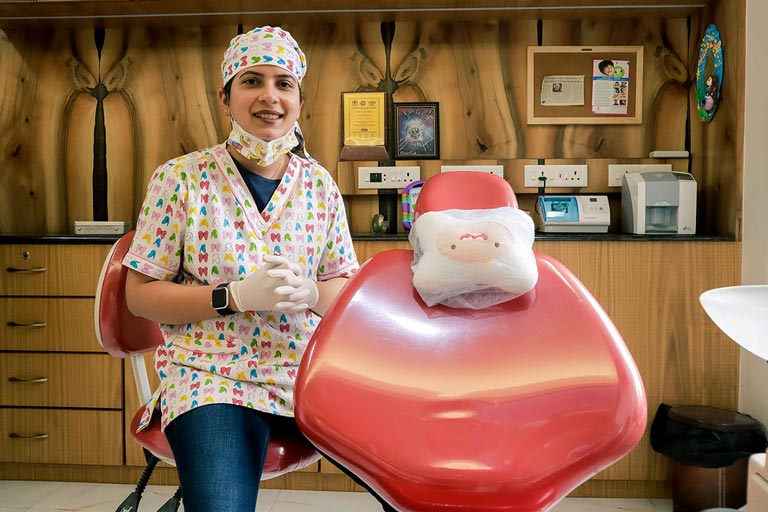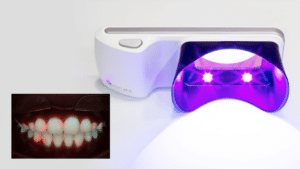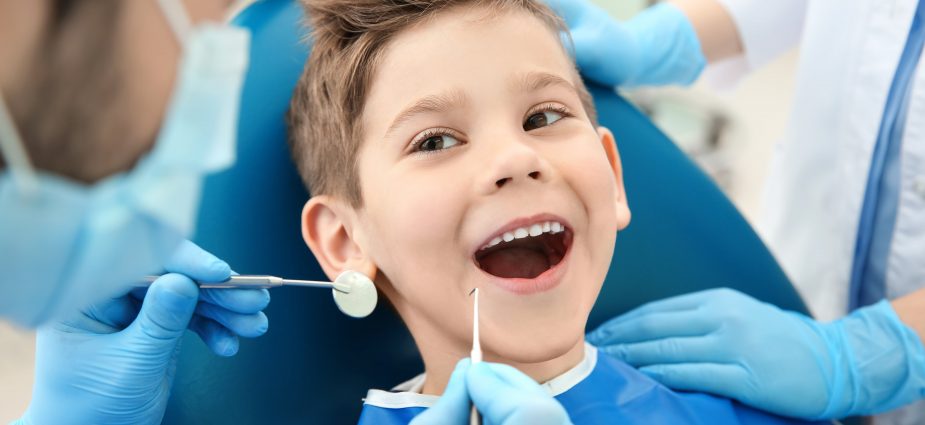As a parent of a child with a cardiac condition, you know the importance of meticulous care in every aspect of their health. One critical area often overlooked is dental care. Dental health is essential, especially for children with cardiac conditions, due to the intricate link between oral health and heart health. I’m Dr. Pratibha Kukreja Pandit, a Pediatric and Preventive Dentistry Specialist in Pune, and I’ve dedicated my career to providing specialized dental care for children, particularly those with special health care needs. I am the Chief Dentist at Pandit Clinic, Dentistry for children, teens, and special needs, and with the help of this article, I aim to highlight the importance of oral health in children with congenital cardiac diseases.
First Things First: Understanding the Link Between Cardiac Conditions and Oral Health
In Children with cardiac conditions, such as congenital heart disease, cyanotic heart disease, and tetralogy of Fallot. Poor oral hygiene can lead to dental infections, which, in turn, can increase the risk of infective endocarditis—a severe infection of the heart valves. Here’s how cardiac conditions can affect oral health and vice versa:
Blood Vessels And Oral Health
Cardiac conditions can impact blood flow throughout the body, including the gums and other oral tissues. When blood flow is compromised, the gums may not receive enough oxygen and nutrients, making them more vulnerable to infections and diseases. This can lead to several issues:
- Inflammation and Swelling: Reduced blood flow can cause the gums to become inflamed, red, and tender.
- Periodontal Diseases: Poor blood circulation can impair the body’s ability to fight off bacterial infections in the mouth, increasing the risk of gum diseases like gingivitis and periodontitis.
Delayed Healing: Compromised blood flow can slow down the healing process after dental procedures or injuries, leading to prolonged recovery and higher chances of complications.
Dental Care and Dry Mouth
Medications for cardiac conditions can often cause dry mouth (xerostomia), which is a significant risk factor for dental caries (cavities). Here’s why:
- Saliva’s Role: Saliva is crucial for maintaining oral health as it helps neutralize acids produced by bacteria, washes away food particles, and has antibacterial properties.
- Increased Risk of Caries: When there’s less saliva, acids can build up in the mouth, leading to an increased risk of cavities.
- Discomfort and Difficulty Chewing: Dry mouth can cause discomfort, making it harder for children to chew and swallow food properly.
Plaque and Tartar Buildup: With less saliva, there’s more plaque and tartar buildup, which can contribute to gum disease and tooth decay.
Building Healthy Smiles from the Start
Infective Endocarditis
Infective endocarditis is a serious infection of the inner lining of the heart chambers and valves, typically caused by bacteria entering the bloodstream. Children with congenital heart defects or other cardiac conditions are at higher risk. Here’s how it relates to dental care:
- Bacterial Entry During Dental Procedures: During procedures like tooth extractions or gum treatments, bacteria from the mouth can enter the bloodstream, especially in children with compromised heart valves.
- Risk Factors: Congenital heart defects, septal defects, and prosthetic heart valves increase the risk of bacteria settling in the heart and causing infection.
- Antibiotic Prophylaxis: To prevent infective endocarditis, children with certain cardiac conditions may need preventive antibiotics before dental procedures. This reduces the risk of bacteria reaching the heart.
Understanding these connections between cardiac conditions and oral health highlights the importance of specialized dental care to minimize risks and promote overall well-being in children with heart conditions.
Maintaining good oral hygiene in children with cardiac conditions is crucial to prevent such complications.
The Role Pediatric Dentists in Managing Dental Care for Childern with Cardiac Conditions
Managing dental care for children with cardiac conditions requires specialized training and skills and interdisciplinary care. Pediatric dentists like myself are trained to handle the unique needs of these children, ensuring their dental treatments are safe and effective. Here’s how we manage dental care for children with cardiac conditions:
- Specialized Training: Pediatric dentists undergo specialized training in managing children with special health care needs, including those with cardiac conditions.
- Multidisciplinary Approach: Collaborating with pediatric cardiologists, paediatricians, oral and maxillofacial surgeons, and anesthesiologists to create a comprehensive care plan.
- Experience and Expertise: My training in advanced pediatric dental treatments under general anaesthesia/ sedation ensures safe and effective care for your child. We work on the concept of a Dental home, wherein early interventions, preventive strategies, and periodic recall minimize the need for complicated dental treatments like root canal treatments and tooth extractions.
Preventive Dental Care: Ensuring Healthy Smiles
Preventive dental care is the cornerstone of maintaining good oral health, especially for children with cardiac conditions. Here are some essential preventive strategies:
Early & Regular: Dental Check-ups
Start dental visits by six months of age or when the first tooth appears. Regular check-ups help in early detection and easy management of dental issues.
Oral Hygiene Tips
- Brushing Techniques and Frequency: Use a soft-bristled toothbrush and age-appropriate fluoride toothpaste to brush your child’s teeth twice daily.
- Flossing and Mouth Rinses: Encourage flossing daily and use antiseptic mouth rinses to reduce plaque. Though mouthwashes are used with caution in children less than 10 years of age, sometimes they are recommended as needed. Do consult a pediatric dentist before using a mouthwash for your child.
- Dietary Recommendations: Limit sugary snacks and drinks to prevent dental caries and promote a balanced diet rich in fruits and vegetables. Sugary treats or juices should be limited to mealtimes and their frequency should be minimized. Medications and syrups also contain sugar, so should be taken before brushing at night.
Dental Treatment: Considerations and Modifications
Dental treatments for children with cardiac conditions require careful planning and modifications to ensure safety. Here’s what we consider:
Pre-Treatment Considerations
- Medical History and Clearance: Obtain detailed medical history and clearance from the child’s cardiologist.
- Antibiotic Prophylaxis: Use antibiotics before certain dental procedures to prevent infective endocarditis.
Safe & Effective Dental Treatment Options
- General Anesthesia and Sedation: Use of extensive dental treatments to minimize stress and discomfort.
- Minimally Invasive Techniques: Employing techniques to reduce pain and expedite recovery.
Our Approach to Pediatric Dental Care
At Pandit Clinic, dentistry for children, teens, and special needs, Pune, our approach to pediatric dental care is patient-centered, focusing on the unique needs of each child. Here’s what sets us apart:
- Patient-Centered Care: Tailored dental care plans that address the specific needs of children with cardiac conditions.
- Comprehensive Dental Services: From preventive care to advanced dental treatments, we ensure your child’s dental health is in expert hands.
Dental care is vital for children with cardiac conditions to prevent complications related to tooth infection and ensure overall health. As a parent, seeking specialized dental care for your child is crucial. If you have a child over five years of age, ask your dentist for a topical fluoride application.
If you have experiences to share or questions to ask, please leave a comment below. For more information on pediatric dental care, keep reading our blog. Visit us at Pandit Clinic, a dentistry for children, teens, and special needs, in Pune, for specialized dental care for your children and teenagers. Stay connected for more insights on pediatric dentistry and cardiac care.
Virtual Video Consultations
100% SAFE AND SECURE CALLS WITH ENCRYPTION. YOUR PRIVACY AND CONFIDENTIALITY IS GUARANTEED.
Start here, by making an appointment for a virtual consultation with our expert Dr. Pratibha Kukreja Pandit (NEW PATIENTS ONLY).
Dr. Pratibha Kukreja Pandit is available for Virtual Video Consultations from Monday – Saturday between the hours of 11 am – 2pm and 4pm – 7pm.
If you are already our valued patient with questions or have an emergency please contact the clinic on +91 9822053446
Consult Dr. Pratibha Kukreja Pandit
(Pediatric Dentist)

Virtual Video Consultation Fees Rs. 500
The Consultation Fees Must Be Paid Online by GOOGLE PAY BEFORE YOUR APPOINTMENT. See The Instructions On Appointment Confirmations
Your virtual video consultation includes:
- Discussion of problems that your child is facing like tooth pain, swelling or any other emergencies
- Dr. Pratibha will recommend a course of treatment or medications for your child.
Meet the Doctor
Pediatric and Preventive Dentistry Specialist
Dr. Pratibha is the Chief Dentist at Pandit Clinic. She is also a Consultant Pediatric Dentist at Kotbagi Hospital and KEM Hospital, Pune.
Dr. Pratibha has trained at the prestigious Chang Gung Memorial Hospital, Taiwan, in advanced areas including Pediatric dental treatment under General Anesthesia and Intravenous sedation, Dental Rehabilitation of children with special health care needs, and Nasoalveolar molding and dental rehabilitation of cleft lip and cleft palate.
She’s the lifetime member of Student Clinician Association, American Dental Association (SCADA), USA.
Professional Affiliations and Skills
- Trained in Pediatric dental treatment under General Anesthesia and Intravenous sedation at Chang Gung Memorial Hospital, Taiwan
- Trained in Dental Rehabilitation of children with special health care needs at CGMH, Taiwan
- Trained in Nasoalveolar molding and dental rehabilitation of Cleft lip and Cleft Palate at craniofacial centre, CGMH, Taiwan
- Awarded Lifetime membership, SCADA (Student Clinician Association, American Dental Association), USA.
You Might Be Interested In

See What Your Teeth Are Hiding with Qscan Plus for Better Oral Health
Oral health is an integral part of overall well-being, yet issues like plaque buildup, cavities, and dental diseases often go unnoticed until they become serious problems. At Pandit Clinic, we prioritize cutting-edge solutions that enhance diagnosis and treatment precision.

Dental Care For Children With Clefts
As parents, ensuring the well-being of our children is our utmost priority. However, when a child is born with a cleft lip or palate, additional









